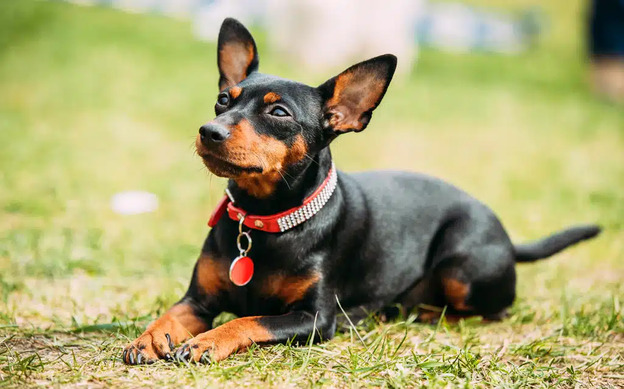The Miniature Pinscher, often affectionately referred to as the "Min Pin," is a small yet dynamic breed that has captured the hearts of dog lovers around the globe. With their sleek coat, lively temperament, and confident demeanor, Miniature Pinschers are not just adorable companions but also spirited little dynamos that thrive on activity and companionship.

The Miniature Pinscher has a history that dates back to Germany in the early 20th century. Contrary to popular belief, the Miniature Pinscher is not a miniature version of the Doberman Pinscher, though they share a similar appearance. The breed was developed from a combination of the Dachshund, Italian Greyhound, and the German Pinscher, resulting in a small dog that possesses the agility and energy of a larger breed.
The purpose of breeding the Miniature Pinscher was to create a small, efficient ratting dog that could control vermin populations in homes and stables. Their lively personality made them not only effective at their job but also delightful companions. The breed was officially recognized by the American Kennel Club (AKC) in 1925 and has since become a popular choice for families and individuals alike.
Miniature Pinschers are known for their striking appearance. They typically stand between 10 to 12.5 inches tall at the shoulder and weigh between 8 to 12 pounds. Their compact and muscular build gives them an agile look, while their short, smooth coat comes in a variety of colors, including black, chocolate, red, and even a combination of these colors with rust markings.
One of the most distinctive features of the Miniature Pinscher is their lively expression, characterized by bright, alert eyes and large, erect ears. Their tail is often docked, giving them a sleek and polished look. This breed's unique appearance, combined with their energetic personality, makes them stand out in any setting.
Miniature Pinschers are known for their spirited nature. They are highly energetic and require regular exercise to keep them physically and mentally stimulated. Their playful demeanor often leads them to engage in antics that can amuse and entertain their owners.
Despite their small size, Miniature Pinschers possess a confident and fearless attitude. They are known for being bold and sometimes stubborn, which can make training a challenge. However, with consistent and positive reinforcement training, they can learn commands and tricks effectively.
Miniature Pinschers are also known for their loyalty to their families. They form strong bonds with their owners and can be protective of their home and loved ones. Early socialization is crucial for this breed to ensure they develop a well-rounded temperament and are comfortable around other pets and people.
Caring for a Miniature Pinscher involves several key aspects:
Exercise: Given their high energy levels, Miniature Pinschers require daily exercise. Regular walks, playtime in the yard, or even agility training can help keep them active and engaged.
Grooming: Their short coat requires minimal grooming. Regular brushing helps to remove loose hair and keep their coat shiny. Additionally, routine dental care and nail trimming are essential for their overall health.
Diet: A balanced diet formulated for small breeds is crucial for the Miniature Pinscher's health. Portion control is important to prevent obesity, as these dogs can be prone to weight gain.
Health Care: Regular veterinary check-ups are important for preventive care. Miniature Pinschers are generally healthy but can be prone to certain health issues, such as patellar luxation and progressive retinal atrophy.
Training a Miniature Pinscher can be a rewarding yet challenging experience. Here are some tips to help you on your training journey:
Start Early: Begin training and socializing your Miniature Pinscher at a young age to ensure they develop good habits and are well-adjusted to different environments.
Positive Reinforcement: Use treats, praise, and play as rewards for good behavior. This encourages your Mini Pin to repeat the desired actions.
Consistency is Key: Be consistent with commands and expectations. Mixed signals can confuse your dog and hinder the training process.
Short Training Sessions: Keep training sessions short and engaging to maintain your Miniature Pinscher's attention. Their high energy means they may become bored if sessions are too long.
Socialization: Expose your Miniature Pinscher to various environments, people, and other animals to ensure they are well-adjusted and confident.
The Miniature Pinscher is a delightful breed that brings joy and energy to any household. With their vibrant personality, striking appearance, and loyal nature, they make excellent companions for active families and individuals. Understanding their history, characteristics, and care requirements is essential for providing a loving and nurturing home for these spirited little dogs. With the right training and socialization, a Miniature Pinscher can thrive as a happy and well-adjusted member of the family, ready to share their playful antics and unwavering loyalty with their loved ones.
animal tags: Miniature-Pinscher
We created this article in conjunction with AI technology, then made sure it was fact-checked and edited by a Animals Top editor.